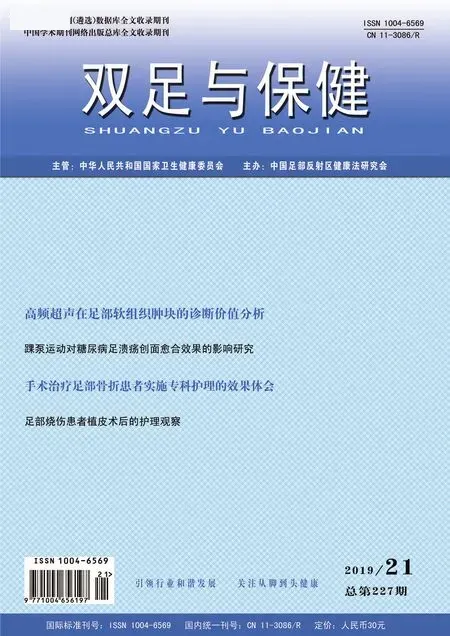對比分析膝關(guān)節(jié)鏡微創(chuàng)手術(shù)、傳統(tǒng)手術(shù)治療脛骨平臺骨折的臨床療效
楊廣友
(江蘇省連云港市贛榆區(qū)人民醫(yī)院,江蘇連云港 222100)
脛骨平臺骨折屬于臨床上十分常見的骨科病癥,該病癥的發(fā)展趨勢具備復(fù)雜性的特征,而且脛骨平臺骨折患者極易伴隨不同程度的并發(fā)癥,因此,應(yīng)對患者實(shí)施及時、有效的診治措施,以便提升患者的生存質(zhì)量。傳統(tǒng)手術(shù)療法極易給患者造成嚴(yán)重的術(shù)后創(chuàng)傷,而且術(shù)后關(guān)節(jié)粘連現(xiàn)象發(fā)生的可能性相對較高,對患者膝關(guān)節(jié)相關(guān)功能的快速恢復(fù)具有一定的不利影響[1]。膝關(guān)節(jié)鏡微創(chuàng)手術(shù)屬于微創(chuàng)手術(shù),已獲得臨床的認(rèn)可及廣泛應(yīng)用[2]。該次研究以2018年1月—2019年2月為研究段,結(jié)果報道如下。
1 資料與方法
1.1 一般資料
篩選出于該院實(shí)施脛骨平臺骨折診治處理的患者110例,應(yīng)用數(shù)字隨機(jī)表對患者進(jìn)行分組,即參照組與觀察組,兩組例數(shù)均為55例。參照組男女例數(shù)之比為 28∶27,年齡均數(shù)為(38.82±2.19)歲,其中跌落致傷、高空墜傷、車禍致傷等情形對應(yīng)的例數(shù)分別為21例、9例、25例,依據(jù)相關(guān)的分型標(biāo)準(zhǔn)作分型處理,可知I型、II型、III型、IV型、V型對應(yīng)的例數(shù)分別為21例、16例、7例、6例、5例。觀察組男女例數(shù)之比為29∶26,年齡均數(shù)為(39.10±2.83)歲,其中跌落致傷、高空墜傷、車禍致傷等情形對應(yīng)的例數(shù)分別為20例、9例、26例,依據(jù)相關(guān)的分型標(biāo)準(zhǔn)作分型處理,可知I型、II型、III型、IV型、V型對應(yīng)的例數(shù)分別為22例、15例、9例、5例、4例。
1.2 治療方法
參照組給予傳統(tǒng)手術(shù)療法,首先應(yīng)明確切口位置,選取患者的膝關(guān)節(jié)前外側(cè)或內(nèi)側(cè)作為切口位置,對脛骨上端、脛骨平臺實(shí)施充分暴露處理,沿半月板下方對關(guān)節(jié)囊作橫向切開處理,隨后向上提拽關(guān)節(jié)囊,對骨折位置實(shí)施復(fù)位處理,確保脛骨平臺關(guān)節(jié)面處于平整狀態(tài)下,在骨缺損位置處置入植骨。如果患者同時伴隨側(cè)副韌帶損傷及半月板損傷情況,應(yīng)對其實(shí)施修復(fù)處理。如果患者存在塌陷骨折情形,則應(yīng)于脛骨前方創(chuàng)建一個窗口,置入骨膜剝離器,以便實(shí)現(xiàn)復(fù)位操作,并在骨缺損位置處作髂骨植骨處理,最后對骨折位置應(yīng)用內(nèi)固定術(shù)。觀察組運(yùn)用膝關(guān)節(jié)鏡微創(chuàng)手術(shù)療法。在膝關(guān)節(jié)鏡的輔助下,于患者的膝關(guān)節(jié)前外側(cè)或內(nèi)側(cè)選擇合適的置入路徑,隨后對關(guān)節(jié)腔內(nèi)的散碎骨、積血等物質(zhì)實(shí)施沖洗處理,觀察骨折移位情況、軟骨缺損程度及平臺塌陷程度,并給予對應(yīng)處理措施。對于I型骨折患者來說,可運(yùn)用按壓復(fù)位方案,固定方式選用拉力螺釘;對于II型、III型骨折患者來說,首先應(yīng)對脛骨平臺關(guān)節(jié)面實(shí)施平整修復(fù)處理,修復(fù)過程需借助撬拔器來實(shí)現(xiàn),隨后在骨缺損位置處作髂骨植骨處理。若經(jīng)X線檢測未發(fā)現(xiàn)異常情況,則需對骨折位置應(yīng)用內(nèi)固定術(shù)。
1.3 觀察指標(biāo)
記錄、對比兩組的臨床診治結(jié)局。記錄、對比兩組的臨床診治有效性。顯效:患者的相關(guān)臨床表征徹底性消退,骨折位置完全愈合;有效:患者的相關(guān)臨床表征呈現(xiàn)明顯的改善跡象,骨折位置的愈合狀況良好;無效:患者的相關(guān)臨床表征并無明顯的變化跡象,甚至趨于嚴(yán)重化,骨折位置的愈合狀況不佳。
記錄、對比治療期間兩組治療結(jié)局的相關(guān)指標(biāo)水平。相關(guān)指標(biāo):手術(shù)持續(xù)時長、下床運(yùn)動時間、術(shù)中切口長度、術(shù)中出血情況。
記錄、對比治療期間兩組患者不良癥狀的發(fā)生情況。不良癥狀:感染、關(guān)節(jié)活性度差、骨筋膜室綜合征。
1.4統(tǒng)計方法
應(yīng)用SPSS 13.0統(tǒng)計學(xué)軟件對數(shù)據(jù)做分析處理,分析相關(guān)數(shù)據(jù)之間P<0.05為差異有統(tǒng)計學(xué)意義。
2 結(jié)果
2.1 兩組診治結(jié)局對照
參照組中顯效、有效、無效對應(yīng)例數(shù)分別為21例、25例、9例,占比對應(yīng)為 38.18%、45.45%、16.36%,即臨床診治有效性為83.64%;觀察組中顯效、有效、無效對應(yīng)例數(shù)分別為24例、27例、4例,占比對應(yīng)為43.64%、49.09%、7.27%,即臨床診治有效性為92.73%。可見,較之參照組,觀察組的臨床診治有效性高出9.09%,差異有統(tǒng)計學(xué)意義(P<0.05)。
2.2 治療結(jié)局的相關(guān)指標(biāo)水平對照
較之參照組,觀察組在手術(shù)持續(xù)時長、下床運(yùn)動時間、術(shù)中切口長度、術(shù)中出血情況等治療結(jié)局相關(guān)指標(biāo)方面的表現(xiàn)更具優(yōu)勢性,差異有統(tǒng)計學(xué)意義(P<0.05)。如表1所示。
表1 兩組治療結(jié)局的相關(guān)指標(biāo)水平對照(±s)

表1 兩組治療結(jié)局的相關(guān)指標(biāo)水平對照(±s)
組別 手術(shù)持續(xù)時長(min)下床運(yùn)動時間(d)術(shù)中切口長度(cm)術(shù)中出血情況(mL)參照組(n=55)觀察組(n=55)114.54±13.23 81.29±10.72 6.52±1.57 3.02±1.29 18.23±2.52 5.87±1.02 64.32±6.56 40.27±5.22
2.3 不良反應(yīng)情況分析
接受診治后,參照組中感染、關(guān)節(jié)活性度差、骨筋膜室綜合征等不良癥狀對應(yīng)的例數(shù)分別為3例、3例、1例,對應(yīng)占比為5.45%、5.45%、1.82%,即不良癥狀的發(fā)生率為12.73%;觀察組中僅存在1例關(guān)節(jié)活性度差的患者,即不良癥狀的發(fā)生率為1.82%。可見,較之參照組,觀察組的不良癥狀發(fā)生率明顯低出10.91%,差異有統(tǒng)計學(xué)意義(P<0.05)。
3 討論
脛骨平臺骨折屬于臨床上較為常見且多見的骨折疾病,誘發(fā)因素為高能量創(chuàng)傷。脛骨平臺骨折患者通常伴隨不同程度的半月板受損、交叉韌帶受損、內(nèi)側(cè)副韌帶受損等癥狀,若患者未獲得及時、有效的診治處理,極易引發(fā)嚴(yán)重的膝關(guān)節(jié)功能障礙癥狀,對患者的正常生活及生活質(zhì)量具有嚴(yán)重的不良影響。脛骨平臺骨折患者術(shù)后的不良癥狀包含關(guān)節(jié)活動度差、骨關(guān)節(jié)炎、關(guān)節(jié)穩(wěn)定性差等,對患者良好預(yù)后的獲得具有嚴(yán)重的干擾性[3]。以往,臨床上通常將傳統(tǒng)手術(shù)療法視為脛骨平臺骨折診治處理的首選方案,并取得一定的臨床效果,不過該方案術(shù)后極易給患者造成較大的創(chuàng)傷,手術(shù)過程耗時較長,患者術(shù)后的康復(fù)進(jìn)程相對緩慢,預(yù)后并不理想。膝關(guān)節(jié)鏡微創(chuàng)手術(shù)療法是最近幾年興起的新型的微創(chuàng)手術(shù)方式,整個膝關(guān)節(jié)手術(shù)的實(shí)施過程都將在膝關(guān)節(jié)鏡的輔助下實(shí)現(xiàn)。膝關(guān)節(jié)鏡微創(chuàng)手術(shù)療法術(shù)后不會給患者造成太大的創(chuàng)傷,手術(shù)過程耗時較短,患者術(shù)后的康復(fù)進(jìn)程明顯提速,對患者膝關(guān)節(jié)功能的快速恢復(fù)及生活質(zhì)量的改善具有重要意義。對脛骨平臺骨折患者實(shí)施手術(shù)療法時,應(yīng)密切關(guān)注患者關(guān)節(jié)面的復(fù)位情況,因為患者關(guān)節(jié)面的復(fù)位情況與其膝關(guān)節(jié)功能的恢復(fù)程度具有密切的關(guān)聯(lián)性。在手術(shù)操作中,借助膝關(guān)節(jié)鏡有助于開闊手術(shù)視野,有助于相關(guān)操作人員觀察、了解患者關(guān)節(jié)面的實(shí)際狀況,同時能夠有效提升骨折固定及復(fù)位操作的精準(zhǔn)性。
有研究指出,將膝關(guān)節(jié)鏡微創(chuàng)手術(shù)療法應(yīng)用于脛骨平臺骨折患者的診治實(shí)踐中,對患者膝關(guān)節(jié)功能的恢復(fù)具有積極的促進(jìn)效果,而且能夠大幅度削減在院診治時間及手術(shù)處理時間,幫助患者獲得良好預(yù)后。對該次實(shí)驗的相關(guān)數(shù)據(jù)展開分析可知,較之參照組,觀察組的臨床診治有效性高出9.09%;觀察組在手術(shù)持續(xù)時長、下床運(yùn)動時間、術(shù)中切口長度、術(shù)中出血情況等治療結(jié)局相關(guān)指標(biāo)方面的表現(xiàn)更具優(yōu)勢性;觀察組的不良癥狀發(fā)生率明顯低出10.91%。這一結(jié)果再次表明,在脛骨平臺骨折患者的臨床診治過程中加入膝關(guān)節(jié)鏡微創(chuàng)手術(shù)療法,能有效降低患者的疼痛程度,改善患者預(yù)后,同時能夠提升臨床治療效果,不會增加嚴(yán)重不良反應(yīng)的發(fā)生率,提示膝關(guān)節(jié)鏡微創(chuàng)手術(shù)療法治療脛骨平臺骨折有效且安全,臨床應(yīng)用價值十分理想。在對脛骨平臺骨折患者運(yùn)用膝關(guān)節(jié)鏡微創(chuàng)手術(shù)療法實(shí)施診治處理時,膝關(guān)節(jié)鏡微創(chuàng)手術(shù)療法可同時作用于關(guān)節(jié)內(nèi)的相關(guān)損傷癥狀,如軟骨、半月板病灶等,而且在手術(shù)操作過程中,無須對患者的關(guān)節(jié)腔實(shí)施充分暴露處理,這在一定程度上削減了膝關(guān)節(jié)面感染情形的發(fā)生率。在膝關(guān)節(jié)鏡微創(chuàng)手術(shù)中,無須再向患者的關(guān)節(jié)腔內(nèi)置入螺釘,同時借助膝關(guān)節(jié)鏡的輔助作用,能夠?qū)崿F(xiàn)螺釘松緊程度的有效掌控,這在一定程度上提升了骨折復(fù)位后的平整程度,而且微創(chuàng)手術(shù)療法也不會對患者的軟組織造成太大的不良影響。
綜上所述,對脛骨平臺骨折患者運(yùn)用膝關(guān)節(jié)鏡微創(chuàng)手術(shù)療法實(shí)施診治處理,診治結(jié)局甚佳,對臨床治愈率的提升、患者病癥康復(fù)進(jìn)程的加速具有積極意義,且安全系數(shù)較高。

